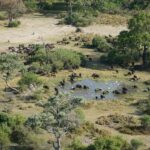Former President Mokgweetsi Masisi is facing a massive lawsuit valued at over P1 billion, filed by prominent businessman Monametsi “Monty” Chiepe. The case stems from the government’s recent decision to import 162 breeding cattle from the United States, a move Chiepe claims undermines his own longstanding initiatives to boost Botswana’s beef industry.
Chiepe’s writ of summons accuses the Ministry of Agriculture (MoA) of infringing on intellectual property and undercutting his business efforts. According to the lawsuit, Chiepe’s companies—Champrimo Botswana (Pty) Ltd, Impact Technologies (Pty) Ltd, and Trilobite Holdings (Pty) Ltd (operating as Impact Genetics)—have been in discussions with the MoA since 2017 to establish a framework for a sustainable beef industry in Botswana. The lawsuit claims that these discussions involved proprietary business models and frameworks developed specifically for the purpose of advancing the nation’s beef industry.
Chiepe contends that the government’s recent cattle importation initiative effectively appropriates the unique frameworks and strategic models his companies presented to the Ministry over several years. According to his attorneys, the government’s decision to proceed with cattle imports—without consulting Chiepe’s companies or compensating them for their intellectual property—constitutes copyright infringement.
The writ also suggests that the MoA acted in bad faith by adopting aspects of Chiepe’s proposals without proper authorization or partnership. Chiepe alleges that the government’s actions violate both copyright laws and the spirit of collaborative development aimed at bolstering the domestic beef industry.
Since 2017, Chiepe’s companies claim to have actively engaged with the Ministry of Agriculture to design a sustainable beef industry model for Botswana, aiming to enhance local cattle production and ultimately reduce reliance on imports. His framework reportedly focused on breeding initiatives tailored to Botswana’s specific environmental conditions, with a view to fortifying the beef industry’s long-term viability.
Despite these initiatives, the government’s abrupt decision to import breeding cattle from the U.S. has raised questions about Botswana’s commitment to self-sufficiency in cattle production. Chiepe’s lawsuit implies that such imports may hinder the growth of Botswana’s domestic beef sector and undercut efforts made to make it globally competitive.
The P1 billion lawsuit sheds light on the challenges facing Botswana’s beef industry, which has long struggled to balance local breeding initiatives with international imports. If successful, Chiepe’s case could set a significant legal precedent for private-sector collaboration with government, potentially encouraging more protection for intellectual property in future public-private partnerships.
This case also underscores the importance of fostering transparency and collaboration between government entities and private entrepreneurs. In addition, it may reignite debate over Botswana’s reliance on imported cattle versus strengthening homegrown industry practices.
As the case moves forward, all eyes are on the legal proceedings and the potential implications for Botswana’s agricultural policies. Former President Masisi, though no longer in office, remains a focal point in the lawsuit, as the cattle import decision was made during his administration.
If Chiepe’s lawsuit is successful, it could lead to a shift in how Botswana approaches intellectual property rights in government contracts, with an emphasis on valuing and safeguarding innovative contributions from the private sector.










